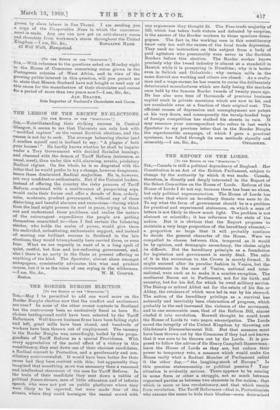THE BORDER BURGHS ELECTION.
[TO TII• EDITOR OFTill " SPEOTATOR.1 Sat,—May I be permitted to add one word more on the Border Burghs election now that the conflict and excitement are over ? In none of the other recent contests in Scotland has the controversy been so 'exclusively fiscal as here. No choicer battleground could have been selected by the Tariff Reformers. Well-known business firms have been failing right and left, great mills have been closed, and hundreds of workers have been thrown out of employment. The vacancy in the Border Burghs was, accordingly, hailed by the propa- gandists of Tariff Reform as a special Providence. With every appreciation of the moral effect of a victory in this constituency, they sent down one of their choicest candidates, a Radical convert to Protection, and a gentlemanly and con- ciliatory controversialist. It would have been better for their cause had they been content with this; but apparently they imagined that something more was necessary than a reasoned and intellectual statement of the case for Tariff Reform. In the train of their candidate they sent down a rabble of political francs-tireurs, men of little education and of infinite speech, who were not put on public platforms where they were likely to be reported, but were made free of the streets, where they could harangue the casual crowd with any arguments they thought fit. The Free-trade majority of 520, which has taken both victors and defeated by surprise, is the answer of the Border workers to those spurious dema- gogues. The fact is, the working men in this constituency know only too well the causes of the local trade depression. They need no instruction on this subject from a body of paid agitators who presumably were never in the Scottish Borders before this election. The Border worker knows precisely why the tweed industry is almost at a standstill in Hawick while it is prospering in Dumfries; why it is better even in Selkirk and Galashiels ; why certain mills in the same district are working and others are closed. As a crafts- man and a wage-earner, he has reason to curse the deliberately deteriorated manufactures which are daily losing the markets once held by the famous Border tweeds of twenty years ago. He has also seen tens of thousands of precious business capital sunk in private mansions which are now to let, and are unsaleable even at a fraction of their original cost. The efficient causes of depression and unemployment are patent at his very doors, and consequently the turnip-headed bogy of foreign competition has stalked his streets in vain. It may reassure your correspondent who refers in last week's Spectator to my previous letter that in the Border Burghs the reprehensible campaign, of which I gave a practidsil specimen, has failed through its own methods signally and






































 Previous page
Previous page